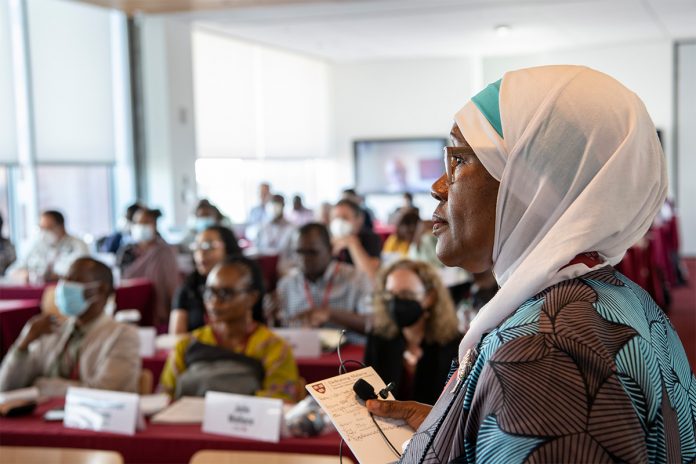July 22, 2022 – In 2021, the longstanding global health goal to eradicate malaria experienced a paradigm shift: after 30 years of development, the first vaccine for the disease was endorsed by the World Health Organization. Countries are now working to incorporate this tool into the existing arsenal of malaria control measures, including insecticides for the mosquitoes carrying the parasite and drug treatments for patients.
To discuss the vaccine and other pressing topics, public health leaders from around the world recently gathered at Harvard University for a week-long course. Participants learned the latest developments from experts in the field, discussed new strategies for eradicating malaria, and built connections with members of the global malaria community.
Held from June 19–24, the 10th annual Science of Eradication: Malaria course was hosted by Defeating Malaria: From the Genes to the Globe Initiative, a cross-Harvard initiative spearheaded by Harvard T.H. Chan School of Public Health in collaboration with the Harvard Global Health Institute, the Barcelona Institute for Global Health, and the Swiss Tropical and Public Health Institute.
Because participants came from a wide range of backgrounds—including academic, governmental, nonprofit, and private sectors—one main objective of the course was for everyone to gain a shared knowledge of malaria fundamentals.
“We discuss biology, entomology, immunology, drug development, control strategies, and social and behavioral aspects, among other topics. This multidisciplinary perspective of the course is at the core of the Defeating Malaria Initiative,” said Marcia Castro, chair of the Department of Global Health and Population and Andelot Professor of Demography.
The course content has also been made available as part of the HarvardX collection of free online courses. MalariaX: Defeating Malaria from the Genes to the Globe has enrolled over 46,000 students to date.
After learning the latest updates across the field, participants used the knowledge to discuss new strategies for tackling malaria eradication. A new session offered in this year’s course focused on rethinking approaches to malaria in the era of COVID-19. The pandemic spurred rapid advances in biomedical research and vaccine development, but also exposed health disparities around the world, including in developed countries such as the U.S.
“That turned into a really exciting discussion … because obviously there’s not a single answer, and things will be different for each country,” said Dyann Wirth, Richard Pearson Strong Professor of Infectious Diseases.
Other discussions centered on three main ideas that participants should consider as they implement malaria control programs in their countries. First and foremost, government buy-in is necessary at the very top levels of leadership. Second, as malaria cases decrease and dedicated programs shut down, surveillance and treatment should be integrated into existing health systems to avoid disease resurgence. Finally, countries should create viable career paths in public health in order for workers to stay in the field.
“The goal of this course is to have leaders make sure that they’re considering all aspects and that they’re bold and confident in their decisions, because that’s what it’s going to take to eliminate malaria,” Wirth said.
Opening remarks for the course were delivered by Jane Kim, dean for academic affairs and K.T. Li Professor of Health Economics. Additional Harvard Chan School faculty and researchers involved with the course included Flaminia Catteruccia, Manoj Duraisingh, Karen Emmons, Joel Lamstein, Muhammad Pate, Regina Rabinovich, Michael Reich and Sarah Volkman.
– Jessica Lau
Photo: Len Rubenstein
Explore HSPH research by topic






